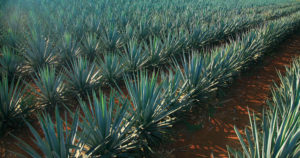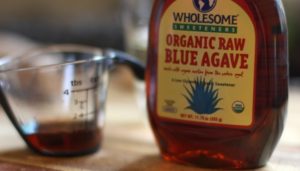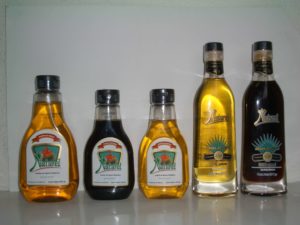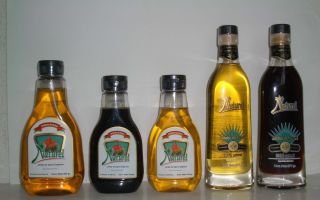Content
- 1 The history of the appearance of syrup
- 2 How agave syrup is made
- 3 Agave syrup composition
- 4 Calorie content and glycemic index of agave syrup
- 5 Why agave syrup is good for you
- 6 How agave syrup is used in cooking
- 7 Harm of agave syrup and contraindications to consumption
- 8 What is the difference between dark agave syrup and light
- 9 How to replace agave syrup
- 10 Conclusion
- 11 Reviews
With the growing interest in nutrition and healthy living, there has been an increase in the demand for dietary products such as agave syrup, used as a natural replacement for white sugar. The benefits and harms of agave syrup is the main topic of the article with details about the beneficial properties, contraindications to use, use and about existing alternatives.
The history of the appearance of syrup

The birthplace of agave is Mexico. This is a rather unpretentious plant that does not need fertilizers or pesticides and gives a rich harvest. Outwardly, it resembles a huge aloe with small blue flowers. From the unopened buds, valuable nectar is extracted by cold pressing. The resulting product is 1.5 times sweeter than white sugar. The simplicity in growing agave has made it popular and ubiquitous.
How agave syrup is made

The variety used to make nectar is called blue agave. He is also an ingredient in the preparation of such a popular drink as tequila. The juice is squeezed out of the buds using a press, then heated to 46 aboutC carry out the thickening of the nectar. There are production technologies that completely exclude heating: then a thick consistency is achieved with the help of special additives.
Some manufacturers use filtration to obtain different shades of the product.
Agave syrup composition
- fructose - 85 - 95%;
- dextrose - 3-10%;
- sucrose - 1.5 - 3.0%;
- inulin - 3 - 5.0%.
This high fructose content makes the syrup sweet. The total weight of carbohydrates in the product is 76%.
Calorie content and glycemic index of agave syrup
The glycemic index (GI) is a measure of the ability of foods to raise blood sugar levels. If the foods we eat have a high GI, then the level of glucose in the body rises rapidly. The GI of agave syrup is low: from 15 to 17 units, which, combined with a low calorie content (310 kcal per 100 g), has helped it become a worldwide popular product in the diet and special diabetic menus.
The fact that agave carbohydrates do not cause a jump in sugar has a positive effect on maintaining the health of the body. Due to its high fructose content, agave syrup is one and a half times sweeter than white or cane sugar, making it economical to use to get the flavor you want.
Why agave syrup is good for you

If you look at the online health and diet food stores that sell agave syrup, you will find a lot of information about its benefits. Review sites are filled with the opinions of satisfied customers. The basis for such statements is the low GI, which was mentioned above. Drinking will not cause a sudden jump in sugar, which, with a low calorie content and a high concentration of fructose, speaks in favor of using agave syrup for those who have diabetes or simply practice a healthy lifestyle.
The Aztecs knew the useful antiseptic properties of the plant, lubricating it with tincture of the wound.
A real syrup, properly prepared from agave, has useful properties:
- contains a complex of vitamins;
- due to the content of fructose, it is able to normalize metabolism;
- removes toxins, toxins;
- contains saponins, which help fight microbes, inflammation, and strengthen the immune system.
Substances fructans in the composition of the product, represented by inulin (in unfiltered dark varieties) and other varieties, have the following properties:
- create a feeling of satiety;
- reduce appetite;
- provide antioxidant action;
- lower bad cholesterol;
- improve calcium absorption by 20%.
Thanks to fructans, agave syrup is not only successfully used to combat overweight and in diabetic menus, but also in moderation is recommended in old age to increase bone density.
The plant is also used to prevent pregnancy, because the dynordrin and anordrin available in it are herbal contraceptives.
Steroid saponins in the plant help against rheumatism.
Thus, its numerous health benefits make agave a home remedy.
How agave syrup is used in cooking

Agave syrup can be used in cooking instead of regular sugar, but due to its high cost, this practice has not found widespread among housewives. It is more often used in confectionery and in the production of expensive drinks: alcoholic (vodka, wine) and non-alcoholic (for example, lemonade).
At home, a sweet drink is considered an aperitif - a way to improve appetite before dinner. It is served neat and after meals, dosing in 50 ml glasses, as well as in cocktails with tequila and liqueurs.
Harm of agave syrup and contraindications to consumption
In addition to the benefits, the product has a negative effect on the body. To avoid harm, they must not be abused.
Having discovered the possibility of using agave syrup as an alternative beneficial sweetener in the diet, it was recommended for patients with diabetes. At the same time, they did not focus on its possible harm.
Later, it was discovered that only the sap of the plant, not subjected to heat treatment, has beneficial properties. When heated, beneficial fructooligosaccharides are converted into fructose, which is not so unambiguous in terms of its effect on the human body.
Indeed, fructose does not raise blood sugar levels, but its systematic use can suppress a person's ability to naturally produce and use the hormone insulin, which, in fact, is a pre-diabetes condition, fraught with the development of type 2 disease.
In addition, a large amount of fructose harms the overload of the liver, as a result of which it is transformed into fats, some of which can endanger the cells of the liver itself and provoke a fatty disease of the organ.
Only unrefined nectar will have real benefits. Industrial filtration products partially or completely lose their benefit.
Data on the properties of the plant allow us to conclude that the regular inclusion of agave syrup in the diet causes harm to the following irreversible violations:
- the development of hypertension;
- intensive fat deposition;
- the appearance of insulin resistance - insulin resistance;
- weakening of liver function.
There are groups of people with contraindications:
- those suffering from diabetes who should not consume syrup on a regular basis;
- with a tendency to obesity;
- pregnant and breastfeeding women.
What is the difference between dark agave syrup and light

The color of agave nectar indicates its quality, method of preparation and degree of filtration. There are light, dark and amber syrup. Light and dark varieties are produced from the same raw materials. But in the second case, the product is filtered less: then it is rich in inulin. Light or dark yellow hue in properties depends on the factor of duration and intensity of heating during thickening. Light syrups taste less intense.
How to replace agave syrup

Sometimes those who want to use a recipe with agave syrup as an ingredient are puzzled by the question: what to replace it with? Earlier, corn syrup was used as a substitute. But it was banned for use because of the danger of developing obesity. The healthier agave was preferred. But this product should not be abused either. Maple syrup contains fewer calories.
Alternative natural sweeteners are also considered:
Xylitol - a natural sweetener, the benefits of which have been known to medicine for half a century. The human body independently produces it in small quantities. It is designated as E967 in product formulations. The study of its properties gives grounds to assert that there is no harm to the body.
Erythritol - another safe natural substitute for the body with a minimum calorie content - only 6 percent of the calorie content of white sugar.
Stevia - a South American culture, from the leaves of which a sugar substitute is produced in the form of a dry plant, powder or liquid. It is the leader in sweetness among other substitutes: 10 - 15 times higher than sugar. The calorie content of stevia is almost zero, so it is useful for weight control.
Conclusion
The benefits and harms of agave syrup remains an unexplored and therefore controversial topic.
The properties reviewed present this exotic sugar substitute in two ways. On the one hand, produced from organic plant materials in a gentle way, it is very popular and appreciated in dietetics. But its high fructose content can be a risk factor for people suffering from diabetes and obesity, so the use of an alternative sweetener should be strictly dosed.
Reviews

